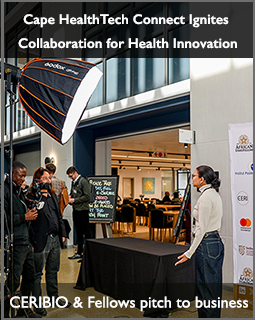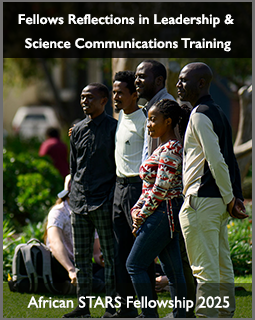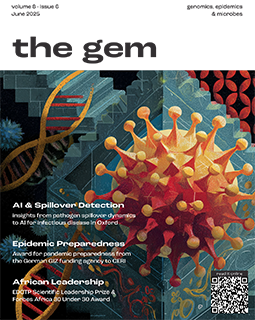Will vaccines work against the new COVID variants? Scientists race to find out
One year later and the new coronavirus is still posing new questions for researchers. The recent emergence of new COVID-19 variants across the world has left scientists searching for answers once again as they try to understand what these changes mean for the pandemic - and vaccine roll-outs. As South Africa awaits the arrival of its first shipment of COVID vaccines there are growing concerns about a new coronavirus variant - known as 501Y.V2 - circulating in the country, and what the changes in the virus could mean for how well the jabs work.
By Aisha Abdool Karim - January 15, 2021

Photo: Flickr/Manatee County Government
The new variant, which first emerged in the Eastern Cape in August, appears to spread much faster than the original form of the virus. President Cyril Ramaphosa said this week: 'This explains the fact that many more people have become infected in a far shorter space of time."
The number of daily infections during South Africa's current second COVID wave has surpassed those seen during the first wave — the highest number of daily infections during the first wave was 13 944 on 24 July last year compared to the latest highest number of recorded cases of 21 980 on 8 January.
Although early research suggests that this new variant doesn't cause more severe illness than the original form of the virus, it does put more pressure on the health system because there are so many more cases which means hospitals get full quicker, Ramaphosa said.
We break down how SARS-CoV-2 has changed and how that might impact South Africa's vaccine rollout.
What makes South Africa's new variant different?
Over time there are small changes that naturally occur in viruses, which are called mutations. These mutations occur when a virus is making copies of itself and small errors appear in its genetic code. Most of the changes that happen during this process don't really impact how the virus works, but some can be significant.
This is what happened with SARS-CoV-2. As the virus continued to spread within communities around the world, mutations started popping up. The new coronavirus, however, tends to mutate at a much slower rate than other viruses, like for instance HIV, because it uses a method called proofreading when it replicates to reduce the number of errors that accumulate.
In December, a genomics team led by the KwaZulu-Natal Research Innovation and Sequencing Platform (KRISP) at the University of KwaZulu-Natal, announced that during routine sequencing of the country's virus they had identified a new variant called 501Y.V2.
The coronavirus, like other viruses, is made up of a string of genetic code. Scientists, like those at KRISP, then try to unravel that code to better understand how the virus works through a process called sequencing. By regularly sequencing samples from COVID tests done in the country, scientists can paint a picture and track how the virus is spreading and evolving.

The new version of SARS-CoV-2 is now dominant in South Africa and is thought to be driving the second wave of the country's pandemic, Health Minister Zweli Mkhize said in December.
A preprint of the KRISP team's findings, which was published on medRxiv on 22 December, explains that there are over 20 mutations in the new variant that makes it different from the initial form of the virus.
One of the main mutations is called N501Y. It occurs in a part of the virus called the spike protein. The spike protein, which sits on the surface of the virus, is a defining part of SARS-CoV-2 because it allows the virus to attach itself to human cells.
The N501Y mutation causes changes to an area of the virus called the 'receptor binding domain" (where the virus latches onto our cells). This change allows the spike protein on the virus to more easily attach onto a person's cells so that the parts better fit together — almost like two puzzle pieces.
South Africa is not the only country where a new variant has been identified. New forms of SARS-CoV-2 have also been reported in the United Kingdom and Brazil.

Although the variant that was identified in South Africa is not related to the one detected in the UK — called B.1.1.7 — there are changes to parts of the binding site of the virus that are similar in both variants. This mutation is thought to increase the transmissibility of the virus, making it spread faster, which could explain why both variants have become dominant in their respective populations.
A December preprint from the Centre for the Mathematical Modelling of Infectious Diseases (CCMID) at the London School of Hygiene & Tropical Medicine estimates that the new variant, first identified in the UK, is 56% more transmissible than the initial virus circulating in the country. Another January preprint on medRxiv found that the new variant could be spreading between 40% and 75% faster than the original virus.
Preliminary modelling shared in a more recent preprint by the CCMID on 11 January, suggests a similar increased transmissibility of around 50% in the 501Y.V2 variant in South Africa. 'We don't yet know for sure how much more transmissible the 501Y.V2 variant is, but early indications are that it may be similar to what they are seeing with B.1.1.7 in the UK," says Richard Lessells, who was part of the KRISP team that identified the 501.Y.V2 variant.
'The UK is able to do hundreds of thousands of sequences so they have more power in the data to then compare the variant against other variants," he explains. 'We've still only got about 300 sequences of the variant in South Africa. So to do that kind of analysis to estimate how much more transmissible is just a bit more complicated."
Will vaccines work against the new variant?
A handful of COVID vaccine manufacturers have released results from their clinical trials and received emergency use approval in countries such as the United States, Israel and the UK. All of these jabs rely on getting our bodies to identify the spike protein on the surface of the coronavirus as a way of producing an immune response.
'What these variants are showing is that this spike gene seems to be one of the regions that's most susceptible to these mutations," explains Lessells. 'That could potentially indicate that even if the vaccines work against the variants we have now, there is a chance that they may not work against further mutations. We therefore need to start thinking about developing vaccines that target areas of the virus that are less likely to mutate."
One of the mutations — called E484K — in the variant identified in South Africa also occurs at the binding domain (where the virus latches onto our cells) and helps the virus to evade antibodies produced by the body's immune system. This raises questions around whether current jabs will work to protect people from the 501Y.V2 variant as it opens up the possibility that the virus can continue to spread.
Scientists are currently investigating how all the new variants will impact the protection offered by vaccines. But in the meantime, a few researchers have studied how our bodies' natural immune response fares against mutations in SARS-CoV-2.
One study shared in a December preprint on bioRxiv looked at whether antibodies from someone who had recovered from COVID-19 were able to kill the virus or stop it from growing in cells in a lab setting. The paper found that the antibodies generated by the original version of the coronavirus were not able to stop the virus from replicating if it had mutations like those in the variants identified in South Africa and the UK.
Another preprint from a team based in the United States shared on bioRxiv in January had similar results. Since most antibodies target the binding site of the virus, the E484K mutation had the biggest impact on helping new variants with this mutation evade the neutralising effect of these antibodies. The E484K mutation's presence in the variant identified in South Africa means that antibodies are likely to be less effective against the new variant and offer less protection, Lessells says.

The E484K mutation also appears in a new variant identified in Brazil. In January, a preprint from a team of Brazilian scientists found that the changing nature of the virus also led to re-infections — meaning that people infected in the previous wave with the circulating virus at the time were not prevented from getting infected with the new variant. These results echo the findings of other papers that document how this particular mutation helps the virus to escape antibodies.
The KRISP team is conducting research looking at how antibodies work against the 501Y.V2 variant in South Africa in a lab setting. The results are expected to be released within the next week.
But, because most of these studies have been conducted in labs, they offer a limited window into how variants of the virus will interact in real people and also whether vaccine-induced immunity could produce different results.
'The immune response to a vaccine is very different and it tends to be broader [than what's being tested in labs]," explains Lessells. 'It's not just antibodies [which is what the lab studies are looking at], but T cells as well, so there are different arms of the immune response."
Our immune systems use two ways to fight off foreign invaders, such as viruses.
The first method uses B cells, which produce proteins called antibodies. These antibodies are a specific response and are tailored towards a particular germ — in other words, the antibodies for each infectious agent, or pathogen, are different. The antibodies lock onto the invader which then makes it easier for your body to identify the virus, or other harmful pathogens, that need to be destroyed.
The second part of our bodies' response involves T cells. There are helper T cells, also known as CD4 cells, which help the B cells make antibodies and also help our bodies to make killer cells. The killer cells destroy the cells in your body that have been infected.
'The hope is that because of that broader immune response in our bodies, these mutations that we're seeing in the variant will not be enough to significantly reduce the efficacy of the vaccines. But the reality is, we just don't know."
What does this mean for South Africa's vaccine rollout strategy?
South Africa recently announced its vaccine strategy aiming to immunise 67% of the population — the country's current plan is aiming to immunise two-thirds of the population against SARS-CoV-2 in order to reach herd immunity. Herd immunity is when enough people have developed an immune response — in the form of antibodies and killer cells — to fight off the virus so that there is a low risk of the virus continuing to spread within that community.
To gain access to enough jabs for a mass vaccination programme, the government says it's procuring jabs in three ways.
It has joined the World Health Organisation's COVAX initiative which aims to ensure equitable access to a COVID jab and will supply the country with enough doses for 10% of its population.
This week Ramaphosa announced that direct negotiations with several manufacturers were also underway — so far 20-million doses of various jabs have been secured (this number includes the jabs that will be provided by COVAX), with the bulk expected to arrive in the first half of the year.
READ MORE: Who should get the COVID-19 vaccine first in South Africa?
South Africa is also part of the African Union vaccine initiative, which will procure doses for the continent in bulk — individual countries will then order from the pooled collection. On Wednesday, Ramaphosa announced that this initiative had secured 270-million doses of different vaccine candidates from Pfizer, AstraZeneca (through the Serum Institute of India) and Johnson & Johnson. The first 50-million shots are expected to arrive between April and June of this year.
Despite indications that antibodies may not have as great an effect on the new coronavirus variants, this doesn't derail the planned vaccine programme, Barry Schoub, the chair of South Africa's ministerial advisory committee on COVID vaccines says.
'It is a concern that less neutralisation of the variant has been shown in blood samples from people who have recovered. But remember this is what's in the laboratory. The human biological system is a lot more complicated," he says.
'It shouldn't necessarily affect the vaccine strategy at the moment. Things are still being studied and it can change but from our current knowledge, vaccines still seem to be effective against the variant."
But research in this area is still ongoing and it is too early to definitively say whether the existing COVID vaccine candidates will work against the new variants that have been identified so far.
Dan Barouch is the director of the Centre for Virology and Vaccine Research at Harvard University and also a professor of medicine at the university's medical school. His team developed the Johnson & Johnson/Janssen COVID vaccine candidate (the jab's results are expected later this month) and is one of the groups testing the vaccine's efficacy against the new variants.
Barouch says if the vaccine turns out to be less efficacious in the new variants, the jabs will need to be updated with new sequences. For mRNA jabs (Pfizer and Moderna) and vector-based vaccines (AstraZeneca and Johnson & Johnson), this will probably only mean a minor change.
'It's not starting from scratch, but it's a new product that has to be manufactured. But if it took a year to make the first vaccines, it's not going to take a year to update them, it'll probably take a few months," Barouch explains.
Given that the variants are not the only forms of the SARS-CoV-2 virus in circulation, people will still get the current vaccines that are available, he says. Then if at a later point there needs to be an update to the jab, there will be another wave of vaccinations.
'But let's hope that's not needed because that will mean there will be a substantial delay before we can control the pandemic. What's really needed now is more vaccines being approved, more vaccines being deployed, and we need the vaccine rollout to go faster. That's what we need to end the pandemic."
Lessells concludes: 'We're building on the scientific data available to understand the significance of these mutations but that doesn't mean we should slow down or change the strategy to get vaccines to South Africa as quickly as possible. In many ways, it makes it more urgent."
News date: 2021-01-15
Links:
Publication cited
Emergence and rapid spread of a new severe acute respiratory syndrome-related coronavirus 2 (SARS-CoV-2) lineage with multiple spike mutations in South Africa. Tegally H, Wilkinson E, Giovanetti M, Iranzadeh A, Fonseca V, Giandhari J, Doolabh D, Pillay S, San E, Msomi N, Mlisana K, Gottberg A, Walaza S, Allam M, Ismail A, Mohale T, Glass A, Engelbrecht S, Zyl G, Preiser W, Petruccione F, Sigal A, Hardie D, Marais G, Hsiao M, Korsman S, Davies M, Tyers L, Mudau I, York D, Maslo C, Goedhals D, Abrahams S, Laguda-Akingba O, Alisoltani-Dehkordi A, Godzik A, Wibmer Cos, Sewell B, Lourenço J, Alcantara Ls, Kosakovsky Pond S, Weaver S, Martin D, Lessells R, Bhiman J, Williamson C, de Oliveira T, medRxiv (2020), https://doi.org/10.1101/2020.12.21.20248640:.











